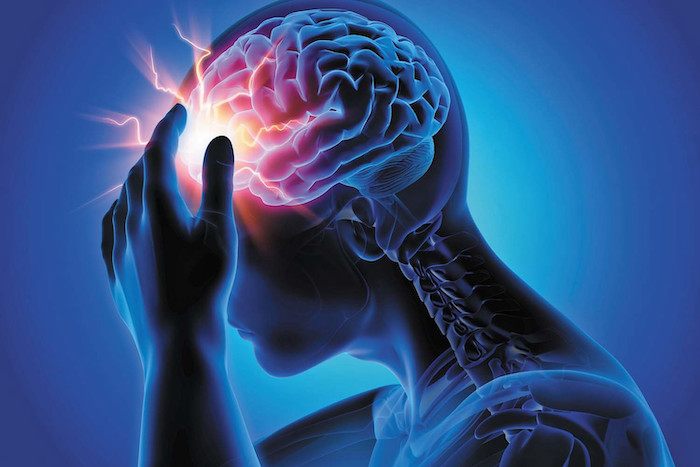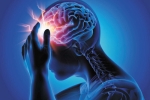
There are various types of headaches that can affect people during the night. Treatment depends on the type of headache and includes medication and home remedies.
Certain types of headaches only happen at night, while some are far more likely to occur during the night or early hours of the morning.
In this article, we look at the different types of headaches that people may experience at night.
We also discuss symptoms and treatment options.
The sections below contain information about different types of headaches that are likely to occur at night.
Hypnic Headache - Hypnic headaches are rare. According to the Migraine Trust, they occur most often in people over the age of 50, although they can also affect younger people. Hypnic headaches are more common in females than males.
Hypnic headaches only occur during sleep. If a person experiences nighttime headaches more than 10 times per month, they may have hypnic headaches. In some cases, hypnic headaches can occur if people sleep during the day.
Some people call hypnic headaches “the alarm clock headache,” because they cause people to wake up often at the same time each night. In fact, people may find that a hypnic headache wakes them up between 1 a.m. and 3 a.m.
Symptoms of hypnic headache may include:
- throbbing pain
- pain on one or both sides of the head
- pain that lasts anywhere between 15 minutes and 4 hours but usually lasts for around 30–60 minutes
- increased sensitivity to light and sound
- watery eyes or a blocked nose
- nausea
Some people may have more than one hypnic headache per night.
Cluster Headache - People who experience multiple headaches may have a cluster headache. These headache episodes, or clusters, can happen between one and eight times per day and last between 15 minutes and 3 hours. Cluster headaches are also one of the most painful types of headaches.
Cluster headaches commonly occur at night and can cause people to wake up 1 to 2 hours after falling asleep.
Researchers are not sure what causes cluster headaches, but genetics may play a part. They usually occur in people who are over the age of 20. Males and people who smoke heavily are also more likely to experience cluster headaches.
Certain factors may also trigger cluster headaches, including:
- alcohol intake
- strong smells, such as paint fumes or solvents
- exercise
- overheating
Symptoms of cluster headaches can include:
- severe stabbing pain on one side of the head, which can include the eye and temple area
- red, watery eyes
- runny nose
- sweating on the side of the head where the headache is
- restlessness and agitation
- a headache that stops abruptly
Tension Headache - Tension headaches can occur due to stress, tight muscles, or fatigue. People may experience tension headaches at night due to tension building up throughout the day.
Symptoms of a tension headache include:
- a dull ache or squeezing sensation on both sides of the head
- pain that feels like a tight band or vice around the head
- aching muscles in the neck, shoulders, or back
- tightness in the jaw
- pain that lasts between 20 minutes and 2 hours
Migraine - Migraine can cause intense head pain and wake people up from sleeping.
According to the American Migraine Foundation, the most common time for people to experience a migraine is the early morning. This is because any pain medication they may be taking to treat the head pain will often stop working after 4–8 hours.
The National Sleep Foundation reports that 50% of migraine episodes occur between the hours of 4 a.m. and 9 a.m.
Symptoms of migraine include:
- moderate-to-severe pain
- nausea
- vomiting
- increased sensitivity to light and sound
- changes in vision, such as seeing flashing lights or zigzag patterns
Each migraine episode can last 4–72 hours.
A doctor should be able to diagnose the type of headache a person has by conducting a physical examination, taking their medical history, and looking at any symptoms.
If a person has any other symptoms that suggest an underlying cause of nighttime headaches, a doctor may also carry out the following:
- blood tests
- MRI or CT scans
- EEG tests, to look at brain wave patterns
The following sections list treatment options based on the type of nighttime headache a person may have.
Hypnic Headache - To treat hypnic headaches, a person can consume caffeine before going to sleep. For people with hypnic headaches, consuming caffeine at bedtime does not seem to prevent them from sleeping.
In some cases, other treatment options may be more effective.
These include:
- melatonin
- flunarizine
- indomethacin
- lithium carbonate
People with stomach ulcers should avoid taking indomethacin, however.
Also, people with dehydration who use diuretics or have kidney or thyroid disease should consult their doctor before taking lithium carbonate.
Cluster Headache - Although there is currently no cure for cluster headaches, there are treatment options to relieve the pain. Cluster headaches produce intense pain rapidly, so many pain relief medications are not effective enough.
According to the Migraine Trust, effective pain relief treatment for cluster headaches can include:
- High-flow oxygen: People can take in extra oxygen through a cylinder and face mask. Breathing in oxygen at a rate of 7–12 liters per minute may help delay or stop a headache episode. This may take 15–20 minutes to treat cluster headaches.
- Sumatriptan: People can take this medication as an injection, which may relieve pain in 10 minutes during a cluster headache episode. People can also take sumatriptan as a tablet or nasal spray, but these forms can be slower to treat the pain.
- Zolmitriptan nasal spray: This may be effective for treating cluster headaches in some people, but it can be slow to take effect.
Preventive treatments are usually an effective way to stop cluster headaches before they start. Preventive medications include:
- verapamil
- methysergide
- lithium
- corticosteroids
- ergotamine
- topiramate
Some of these preventive treatments can have side effects, so a doctor may need to monitor people while they are taking them.
Tension Headache - If a person experiences tension headaches at night, taking over-the-counter pain relief medication before bedtime may help.
Applying a warm compress to the area or taking a warm bath or shower before bed can also help relax the muscles and relieve any tension.
Migraine - There is currently no cure for migraine, though it is possible to treat the symptoms. People can take medication either to relieve the pain during a migraine episode or to prevent the development of a migraine in the first place.
Managing stress through relaxation techniques and regular exercise may also help prevent the severity or frequency of a migraine episode.
A person should see their doctor if they have frequent or severe headaches at night. A doctor will be able to carry out tests to check for any underlying causes and to find out which type of headache the person may be experiencing.
A person should also see their doctor if they notice any unusual symptoms, such as:
- getting new headaches after the age of 50
- changes in personality or mental state
- getting headaches after a knock to the head
- headaches that stop them from doing everyday activities
- fatigue or muscle weakness
People may be able to prevent or reduce the severity of headaches at night through practicing good sleeping habits.
For example, people may be able to get better sleep by:
- waking up and going to sleep at the same time every day
- getting 7–8 hours of sleep each night
- avoiding caffeine before bedtime, unless using it specifically as a treatment option
- avoiding alcohol and nicotine, as these can affect sleep
- unwinding and relaxing before going to sleep
People may be able to relieve headaches at night with pain relief medication, relaxation techniques, and good sleeping habits.
If a person has severe or persistent headaches at night or notices other symptoms alongside a nighttime headache, they should see their doctor.
Precision Pain Care and Rehabilitation has two convenient locations in Richmond Hill – Queens, and New Hyde Park – Long Island. Call the Queens office at (718) 215-1888 or (516) 419-4480 for the Long Island office to arrange an appointment with our Interventional Pain Management Specialist, Dr. Jeffrey Chacko.













